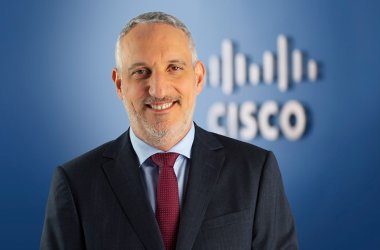CNME Editor Mark Forker secured an exclusive interview with Sudhir Chadaga, Chief Strategy Officer at Motorola Mobility, to find out how the company has been able to turn its fortunes around, its entry into the B2B marketplace – and the success of its ThinkShield product line.
Sudhir Chadaga is one of the most respected IT leaders in the industry.
He has enjoyed a stellar and decorated career, which started back in 2000 with Hewlett-Packard.
In the two decades that have passed, Chadaga has held senior positions with Deutsche Bank, General Motors and Lenovo.
In 2016, he was appointed as the Global Head of Strategy, Restructuring & Transformation at Motorola, and is currently the Chief Strategy Officer at the smartphone behemoth, who was acquired by Lenovo in 2014.
In a candid exchange with CNME Editor Mark Forker, Chadaga outlined that despite being acquired by Google, and then Lenovo, the company was still haemorrhaging money.
Motorola simply had to change the way it conducted its business.
“We were losing a lot of money, so there was a concerted effort to turn the business around and fix it. We started to shut-down some product lines, and we exited some unprofitable markets – and really focused on what our core strengths were. We did a lot of business rationalisation and through that we really concentrated on making sure the business could run at a stable level profitably. We got to that point around 2019, and since then we have been attempting to re-enter markets, and introduce new lines of product. Our strategy has been successful because for the last 12 quarters we’ve been running the global business profitably,” said Chadaga.
Chadaga has been a key figure in Motorola’s renaissance, but as the old saying goes, the more things change the more they stay the same, and that is certainly the case when it comes to Motorola’s market presence in Latin America.
“We are pretty dominant in Latin America. Overall, we have around a 21% market share. There are certain markets where we are much bigger. In Argentina, we have a 40% share, and in Brazil and Mexico we have a share of 30% and 25% respectively. That’s been a core marketplace for us, and we’ve been continuing to grow there. But Latin America has always been Motorola’s biggest market,” said Chadaga.
The Chief Strategy Officer said that Motorola’s market share in North America is 10% – and the company is firmly established as the No.3 player in North America, after Apple and Samsung.
Europe was a marketplace in which Motorola reduced its footprint a number of years ago because it became an unprofitable market for them, but they are making a comeback – and are also focusing on the Middle East and Asia.
“We have started to slowly increase our focus in Europe. We play in the Western Europe markets now, and we are also in a few Eastern Europe markets too, so we’ve been very selective. However, we’re enjoying growth, so it’s been very positive. In the Middle East, we had shrunk our presence quite a bit, but we are seeing significant growth year-on-year across the region, over the last 12 months we grew by 22%, and it is growing rapidly. In Asia, our primary focus is India, Japan and Australia, and we’re selectively looking at opportunities in South Korea. We were pretty big in India at one point. We were close to 10% in the overall Indian market, so that is a big focus area for us moving forward. We’re being cautious, we don’t want to go back to those days where we had a lot of volume, but lost a lot of money, so we are taking a cautious approach, but we are encouraged by the growth,” said Chadaga.
The fact that Motorola has now enjoyed growth for a staggering 12 consecutive quarters, has enabled the company to start making investments in a number of different areas.
As Chadaga points out, they are increasing their investments in the premium space.
“We are investing in premium products. We just announced our new razr product, and last year we launched the third generation of our Edge product. We are seeing a lot of momentum globally with our premium business growing by 75% year-on-year. We’re also doing a lot of innovation in terms of experiences on our devices and software capabilities. In addition to this, we are also opening up new markets to support regions in a bid to increase our footprint. Today, our products reach about 85 countries, but we’re looking to grow and expand that number. A very important focus for us has been on building the brand. We want to make people aware that we are still a very credible brand, and that we are back in the premium marketplace,” said Chadaga.
Traditionally, Motorola has never participated in the B2B space, but as Chadaga reveals the company is now firmly focused on B2B.
“B2B is an area that we identified as an opportunity for us to get into a few years ago. There are a few reasons for that, and one is the fact that it is a large market that we historically had been out of, we never participated in B2B. It was all reactive, we might have a customer come to us and ask us to sell them devices, but we never had a proactive strategy, but that has all changed now. We started in Europe, that’s the first B2B market we entered, and we are now operating the enterprise business globally,” said Chadaga.
Chadaga said that a combination of being under the umbrella of Lenovo, and considering their expertise in B2B, it made sense for Motorola to enter the B2B market.
“One of the key factors for us from a B2B perspective is the fact that we are part of the Lenovo family. Lenovo is a powerhouse when it comes to commercial enterprise B2B. For Motorola, it is very logical for us to be part of that journey with Lenovo. It allows us to bring something different to the party, which is an entire ecosystem of products to the commercial space, whether that’s phones, tablets, or PCs,” said Chadaga.
Despite the competitive nature of the B2B marketplace, Chadaga was bullish in his belief that they can be successful, and made no secret of his ambitions.
“We have a bold ambition, we know the B2B space is competitive, and it’s dominated by Apple and Samsung, and other players that are participating in the B2B ecosystem. However, we have big aspirations, and we have a goal of being the clear No.3 player in the B2B space. We’re seeing a lot of traction, when we speak to global customers’ they like the Motorola brand, it is respected globally. Our partnership with Lenovo adds not only a lot of credibility, but also the ability to go and execute,” said Chadaga.
ThinkShield has struck a chord with Motorola customers, and Chadaga explains why he believes it has resonated with so many end-users.
“What ThinkShield does is if your phone boots up, and has not thrown an error, as an end-user you can have peace of mind that this phone is running in a secure manner. We take an absolutely zero trust approach to our devices, and we make sure that at every step we’re doing checks. That fine grained testing that we do really helps us build that security end-to-end. We also keep adding more to it from a security standpoint, there are so many new capabilities that we have added. We have a dedicated hardware chip in which we save passwords and keys. If something gets compromised, or corrupted in the main memory module nobody can steal your passwords from our phones because all of that is saved in a tamper proof separate location,” said Chadaga.
Chadaga believes that one of the key differentiators for Motorola is the fact they can leverage Lenovo’s expertise on execution to crack the B2B space.
“We want to deliver devices that have the innovation and the capabilities that customers want. Our end-to-end set of solutions go hand-in-hand with the way we want to solve problems for our customers. We want to take feedback from them and then build solutions that we know will help them overcome their challenges. Working with Lenovo is huge for us, they have the discipline and experience in execution, and we just need to learn from that discipline and execution, because working with commercial customers is a whole new ball game for us at Motorola. If I look at the market there are not too many others that can say we can bring you a smartphone, smartwatch, PC, tablet or server to the table, but Motorola and Lenovo can bring customers the entire ecosystem of products and solutions to the marketplace, and that certainly gives us a competitive advantage,” said Chadaga.
He concluded a brilliant conversation by highlighting his pride in the level of customer experience they can provide to their customers.
“One of the things that I really feel proud of is that we from a Motorola perspective are available to customers 24/7. That really differentiates us, we want to be there, and we want to be reachable for our customers, and we take great pride in being responsive to them. We have enjoyed great success of late, and we believe the building blocks are in place for us to continue to grow in all markets over the next 12 months,” said Chadaga.





